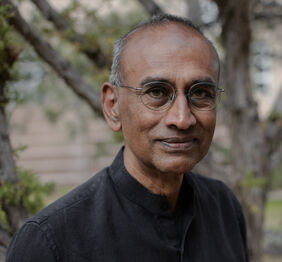Noble Prize winner:
Prof. Dr. Venki Ramakrishnan
We are proud that Nobel Prize winner Prof. Venki Ramakrishnan has accepted our invitation to give a lecture in October as part of the public lecture series “Noble Talks.”
He will speak about "My Adventures in the Ribosome".
The ribosome is the ancient and enormous molecular machine that reads genetic information on mRNA to synthesize proteins. Although it was discovered in the 1950s, it took several decades to determine an atomic structure of the ribosome because of its complexity.
This talk will cover my own efforts to unravel its structure and aspects of its function. I will also speak about my own career which involved living on three continents and involved switching from my initial training in physics to learning and carrying out research in molecular biology.
| Title: | My Adventures in the Ribosome | |
| Speaker: | Prof. Dr. Venki Ramakrishnan MRC Laboratory of Molecular Biology, Cambridge Biomedical Research Campus Cambridge, United Kingdom | |
| When: | October 23, 2025, 5:00 pm | |
| Where: | Hörsaal Abbe-Zentrum Beutenberg Beutenberg Campus Hans-Knöll-Str. 1 07745 Jena | |
| Host: | Leibniz Institute on Aging - Fritz Lipmann Institute (FLI) |
The public lecture series is sponsored by the Carl Zeiss Foundation.
The lecture will be held in English.
Everyone is welcome.
Who is Venki Ramakrishnan?
Venki Ramakrishnan received his bachelor’s degree in physics from Baroda University in India in 1971 and his Ph.D. in physics from Ohio University in 1976. He then studied biology for two years at the University of California, San Diego before beginning his postdoctoral work with Peter Moore at Yale University. After a long career in the USA at Brookhaven National Laboratory and the University of Utah, he moved to England in 1999, where he has been a group leader at the MRC Laboratory of Molecular Biology in Cambridge. He received the Nobel Prize for Chemistry in 2009 and was the president of the Royal Society from 2015-2020.
In 2000, Ramakrishnan’s laboratory determined the atomic structure of the 30S ribosomal subunit and its complexes with ligands and antibiotics. This work led to insights into how the ribosome “reads” the genetic code, as well as antibiotic function. Ramakrishnan’s lab subsequently determined high-resolution structures of functional complexes of the entire ribosome at various stages along the translational pathway, which led to insights into its role in protein synthesis during decoding, peptidyl transfer, translocation and termination. For the last decade, his laboratory has been applying cryoelectron microscopy to study eukaryotic and mitochondrial translation, especially initiation of translation and translational regulation.
Ramakrishnan is the author of two popular books, Gene Machine (2018), a very frank popular memoir about the race for the structure of the ribosome, and more recently, Why We Die: The New Science of Aging and the Quest for Immortality (2024).









